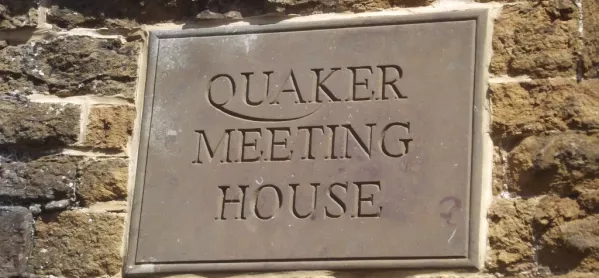I don’t often find myself agreeing with Ofsted, but in 2017 we finally heard some sense from Amanda Spielman. She declared that she’d like to see schools move away from “teaching to the test” - this chimes with the pedagogy used at my school, Sidcot, a Quaker school in Somerset for students aged 3-18.
There are only seven Quaker schools in England. Independent, non-selective and unique, they are founded on the Quaker principles of equality, truth and respect. We have successfully lived and taught by this philosophy since 1699, yet there is limited awareness of our approach within the wider education sector.
Each school is different but shares a common educational approach, based on Quaker beliefs. These include the Quaker practice of weekly Meeting for Worship and an open and supportive culture where teachers and students are considered equals and everyone’s voice counts.
Quaker schools research project
To determine whether there is any quantifiable correlation between the Quaker principles we embed and our students’ engagement and success with learning, we recently took part in a research project by the University of Bristol’s Nigel Newton: Schools for Wellbeing - the Educational Significance of Quaker School Culture.
The findings of this research revealed that our Quaker values have an impact on learning. They result in students who are more likely to develop a love for learning, use deep learning approaches and achieve academically - while suffering from much less stress and anxiety.
So what are the learnings here for educational professionals outside of a Quaker school? Well, the study had some very interesting and perhaps surprising findings. Quaker schools, like the majority of schools across the UK, are non-selective, yet counter-intuitively our students perform very well in exams - consistently out-performing national averages at all levels.
These strong academic achievements are not because we take the cream but, as the research found, is down to the Quaker culture within our schools. The research attributes the open, respectful relationships our students have with teachers, who they feel are “on their side”, with them taking increased responsibility for their own learning.
Against the exam factory
Perhaps more importantly though, particularly with an alarming increase in the number of young people suffering from anxiety and other mental health issues, is the long-term influence these relationships have. We are staunchly against the exam factory model and a key finding of the research shows students from Quaker schools were less anxious and stressed in and out of school. The supportive culture instils confidence and self-belief which in turn increases their resilience and positively influences the teaching and learning interaction between teacher and students.
Although I was heartened to hear Ms Spielman’s viewpoint on testing, sadly her colleagues in the Department for Education do not seem to echo this view. With a reformed GCSE curriculum and narrow emphasis on exams, there’s more pressure than ever to teach to the test. Yet findings from the research revealed that students see Quaker schools as more egalitarian, where they have a voice and as a result are more likely to become deep learners motivated by a desire to understand the subject, rather than surface learners following rote learning techniques, motivated by grade outcomes alone.
Interestingly, the research also found a clear link between school culture and the Quaker practice of silence in our weekly Meeting for Worship. As teachers, we appreciate the impact of an entire school sitting in silence, which the research showed contributed to the unique atmosphere at our schools. In these sessions everyone is equal and anyone can speak should they wish and students saw this as the personification of the culture in real terms. They feel they can be themselves and speak freely in whatever forum and are more likely to be enquiring and open to exploring concepts without fear of ridicule - which in turn deepens their learning. These periods of silence are also very calming and allow time for personal reflection. It’s incredibly powerful and my favourite part of the school week.
Holistic approach
Teachers also took part in the research and although most are not Quakers, which is the same for the majority of students in Quaker schools, they value the holistic approach which gives them a sense of freedom to teach students as individuals. They don’t feel pressured by evaluations of their roles based exclusively on students’ exam performance.
I will be the first to champion raising academic achievement in schools. However, as the study suggests, it’s time to ditch the exam factory model and empower learners through the creation of a climate of mutual trust and respect. After all, children don’t grow taller by measuring.
Iain Kilpatrick is the headmaster at Sidcot School
Want to keep up with the latest education news and opinion? Follow Tes on Twitter and Instagram, and like Tes on Facebook
